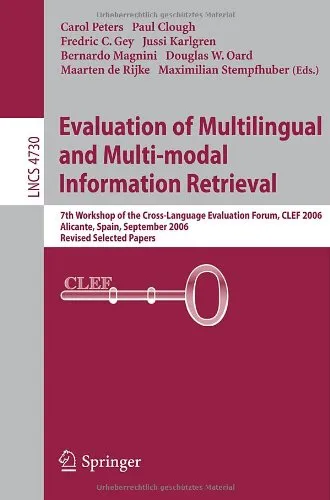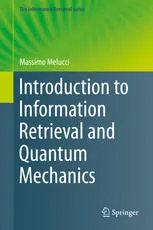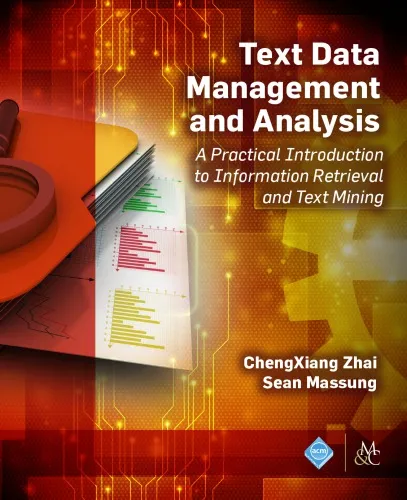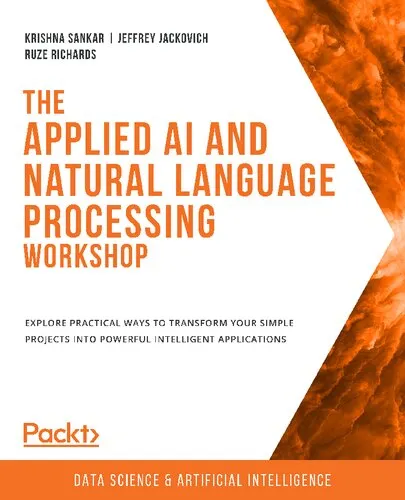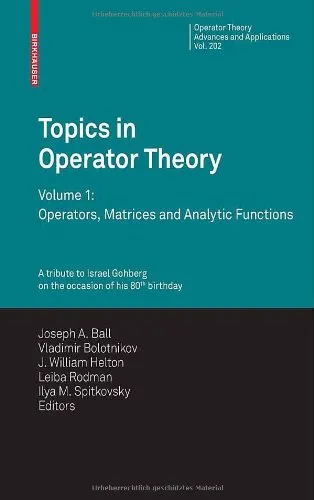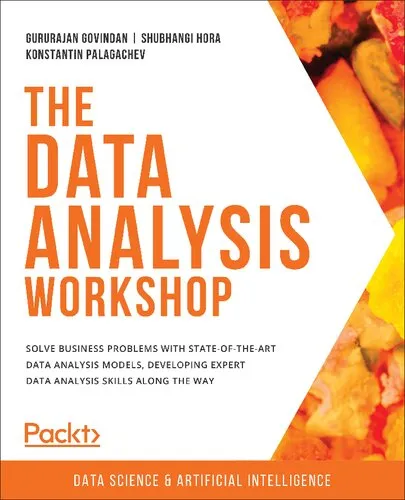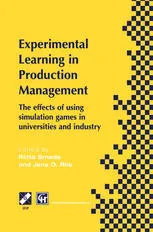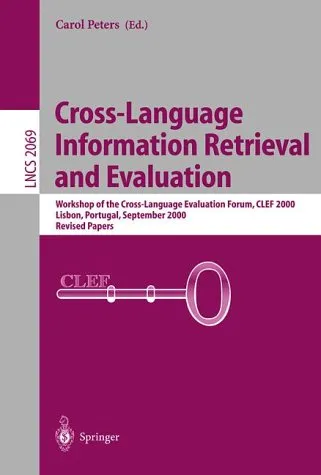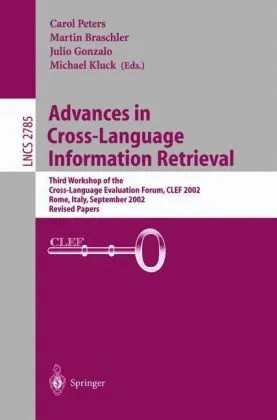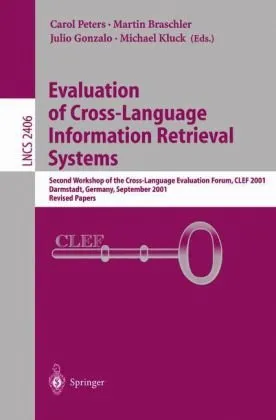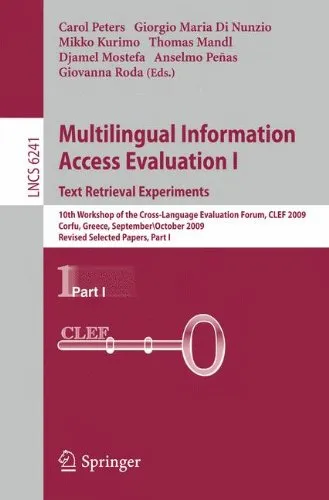Evaluation of Multilingual and Multi-modal Information Retrieval: 7th Workshop of the Cross-Language Evaluation Forum, CLEF 2006, Alicante, Spain, September 20-22, 2006, Revised Selected Papers
4.5
بر اساس نظر کاربران

شما میتونید سوالاتتون در باره کتاب رو از هوش مصنوعیش بعد از ورود بپرسید
هر دانلود یا پرسش از هوش مصنوعی 2 امتیاز لازم دارد، برای بدست آوردن امتیاز رایگان، به صفحه ی راهنمای امتیازات سر بزنید و یک سری کار ارزشمند انجام بدینکتاب های مرتبط:
مقدمهای بر کتاب
کتاب Evaluation of Multilingual and Multi-modal Information Retrieval، مجموعهای از مقالات اصلاح شده و برگزیده از هفتمین کارگاه Cross-Language Evaluation Forum یا CLEF است که در سپتامبر ۲۰۰۶ در آلیکانته اسپانیا برگزار شد. این کتاب به بررسی نوآوریها، چالشها و روشهای ارزیابی اطلاعات چندزبانه و چندحالته میپردازد.
در دنیای امروز که اطلاعات از منابع و زبانهای گوناگون در دسترس قرار دارد، یافتن بهترین روشهای درک، پردازش و ارزیابی دادهها اهمیت بسیاری دارد. این کتاب بستری جامع برای پژوهشگران، دانشجویان و متخصصان علوم اطلاعات فراهم کرده و آنها را در فهم عمیقتر مفاهیم پایه و پیشرفته این حوزه یاری میدهد.
خلاصهای جامع از کتاب
کتاب حاضر شامل ۵ بخش عمده است که موضوعات متنوعی را شامل میشود، از جمله:
- اعتبارسنجی Cross-Language Retrieval: پژوهشگرانی در این بخش روشها و متدولوژیهای جدیدی برای بازیابی اطلاعات از زبانهای مختلف ارائه دادهاند.
- مدلهای Multi-modal Retrieval: تمرکز این بخش بر ادغام حالتها و منابع مختلف، شامل متن، تصویر، و دادههای صوتی در بازیابی موثر اطلاعات است.
- پیشرفت در Translation-Based Retrieval: ایدههایی برای بهبود عملکرد ترجمه ماشینی در بازیابی اطلاعات بیان شده است.
- ارزیابی Performance: با تاکید بر استفاده از دادههای استاندارد و معیارهای مشخص برای سنجش کیفیت سیستمها.
- کاربردهای عملی: از جمله کاربرد در موتورهای جستجو، سیستمهای پاسخگویی سوالات، و بازیابی اطلاعات پزشکی.
هر مقاله با دقت و وضوح نوشته شده و عمدتاً بر اساس تجربیات علمی کارگاه CLEF طراحی شده است. هدف آن، بهبود قابل ملاحظه تحقیق و توسعه در حوزه اطلاعات چندزبانه و چندحالتی است.
نکات کلیدی
کتاب Evaluation of Multilingual and Multi-modal Information Retrieval نکات برجستهای دارد که آن را برای هر کسی که به بازیابی اطلاعات علاقهمند است مفید میسازد:
- تمرکز بر ارزیابی علمی و موضوعی سیستمهای Retrieval در مقیاس جهانی.
- بحث در خصوص چالشهای پردازش زبان طبیعی برای زبانهای کمترمتداول.
- ادغام بازیابی چندحالتی، که تعامل میان متن و رسانههای دیگر را ممکن میسازد.
- ارائه دادههای ارزیابی و رقابتهای استاندارد برای افزایش شفافیت پژوهشها.
- ایدههای جدید برای طراحی سیستمهای قویتری که بتوانند با ورودیهای متنوع و گوناگون سروکار داشته باشند.
نقل قولهای مشهور از کتاب
در ادامه، برخی از نقلقولهای قابل توجه از این کتاب را آوردهایم:
"The ultimate goal is not just to retrieve data across languages, but to deliver content that truly understands the user's intent."
"Multi-modal retrieval aligns human capabilities with machine learning technologies to achieve unprecedented results."
"Evaluation is the cornerstone of progress. Without robust benchmarks, innovation in information retrieval can stagnate."
چرا این کتاب اهمیت دارد
تحقیق در حوزه بازیابی اطلاعات، به ویژه در محیطهای چندزبانه و چندحالتی، یکی از موضوعات بنیادین و ضروری در علوم کامپیوتر و اطلاعات است. این کتاب نقشی کلیدی در توسعه ابزارها و تکنیکهایی ایفا کرده که کیفیت سرویسهای دیجیتال، از جمله موتورهای جستجوی پیشرفته و سیستمهای تحلیل داده را بهبود میدهند.
پژوهشگران، دانشجویان و متخصصان میتوانند از این کتاب به عنوان منبعی برای الهام گرفتن، یادگیری و همچنین شرکت در چالشهای پیش رو استفاده کنند. از آنجا که دادهها و مطالعات موجود در کتاب بر پایه روشهای علمی و نتایج واقعی کارگاه CLEF هستند، اعتبار علمی و کاربردی بالایی دارند.
در نهایت، این کتاب به پیشرفت میدان بازیابی اطلاعات در گذشته کمک کرده و همچنان به عنوان پایهای برای تحقیقات آینده باقی خواهد ماند.
Introduction to "Evaluation of Multilingual and Multi-modal Information Retrieval"
The book, "Evaluation of Multilingual and Multi-modal Information Retrieval: 7th Workshop of the Cross-Language Evaluation Forum, CLEF 2006," celebrates advancements in the rapidly evolving domain of multilingual and multimedia information retrieval systems. Edited by an esteemed group of scholars, this volume compiles revised and selected papers that were presented during the Cross-Language Evaluation Forum (CLEF) 2006, held in Alicante, Spain.
Through a comprehensive blend of theoretical insights, results from shared evaluation tasks, and innovative methodologies, this book serves as a treasure trove for researchers, practitioners, and academicians who aim to tackle the complex challenges of extracting meaningful information across languages and modalities. By presenting cutting-edge research, CLEF 2006 underscored the growing role of evaluation as a driving force for innovation and collaboration in this field.
Detailed Summary of the Book
The book provides readers with a deep understanding of techniques and benchmarks designed to evaluate and improve information retrieval systems that function in multilingual and multi-modal contexts. Spanning a wide range of topics, the contents highlight challenges in cross-language information retrieval (CLIR), speech retrieval, image and video retrieval, and robust evaluation frameworks.
First and foremost, it chronicles the activities of CLEF 2006, including the shared tasks that engaged global research teams. These tasks aimed to address the inherent difficulties in building systems capable of accurately retrieving information across diverse languages, formats, and media types. Particularly notable was the emphasis on extending evaluation strategies to incorporate multimedia queries (images, audio, and video) as well as multilingual considerations.
The book also delves into the significance of user-centric practices in the design of information retrieval systems. By leveraging real-world examples and practical use cases, the contributors demonstrate how theoretical concepts can be applied in practice. Case studies presented in this volume encompass experiments evaluating diverse data collections and information formats, ensuring a robustly documented understanding of IR methodologies.
Key Takeaways
- The value of collaborative evaluation campaigns, such as CLEF, as a catalyst for advancing multilingual and multimedia retrieval research.
- Insights into the complexity of balancing precision, recall, and language independence in modern information retrieval systems.
- The growing importance of multi-modal approaches, incorporating audio-visual and textual data to enhance retrieval capabilities.
- Techniques for leveraging large evaluative datasets to fine-tune and benchmark innovative models and systems.
- A systematic exploration of state-of-the-art practices in result evaluation, including methodologies specific to multimedia and multilingual documents.
Overall, readers gain an appreciation for the interplay between user behavior, evaluation techniques, and system architecture, making it an indispensable guide in the field.
Famous Quotes from the Book
"Evaluation is not just a measure of success or failure; it is the language through which research speaks to its peers."
"The challenges of multilingualism are not solved by technology alone; they demand a deep understanding of language, culture, and contextual relevance."
Why This Book Matters
The significance of this book lies in its role as a foundational work in the domain of multilingual and multi-modal information retrieval. As globalization continues to drive the rapid exchange of information across languages and cultures, IR systems must adapt to bridge linguistic and modal divides.
By documenting the findings from CLEF 2006, this book provides an enduring legacy of how collaborative evaluation efforts can accelerate innovation. It serves as a blueprint for researchers aspiring to improve information retrieval systems and expand their functionality to incorporate various forms of data and queries. Importantly, the book fosters a sense of community by presenting methodologies that were developed collaboratively across research institutions worldwide.
The practical relevance of this work extends to industries such as search engines, digital libraries, and multimedia platforms, where the extraction of accurate and meaningful data is paramount. Furthermore, the wealth of knowledge within its pages makes it a key resource for anyone involved in building future-ready IR systems that cater to a global audience.
Whether you are an academic, a data scientist, or an industry practitioner, "Evaluation of Multilingual and Multi-modal Information Retrieval" will guide you in understanding and solving complex challenges associated with modern IR systems while inspiring new ideas for future development.
دانلود رایگان مستقیم
شما میتونید سوالاتتون در باره کتاب رو از هوش مصنوعیش بعد از ورود بپرسید
دسترسی به کتابها از طریق پلتفرمهای قانونی و کتابخانههای عمومی نه تنها از حقوق نویسندگان و ناشران حمایت میکند، بلکه به پایداری فرهنگ کتابخوانی نیز کمک میرساند. پیش از دانلود، لحظهای به بررسی این گزینهها فکر کنید.
این کتاب رو در پلتفرم های دیگه ببینید
WorldCat به شما کمک میکنه تا کتاب ها رو در کتابخانه های سراسر دنیا پیدا کنید
امتیازها، نظرات تخصصی و صحبت ها درباره کتاب را در Goodreads ببینید
کتابهای کمیاب یا دست دوم را در AbeBooks پیدا کنید و بخرید
1196
بازدید4.5
امتیاز0
نظر98%
رضایتنظرات:
4.5
بر اساس 0 نظر کاربران
Questions & Answers
Ask questions about this book or help others by answering
No questions yet. Be the first to ask!
